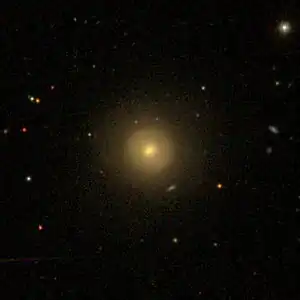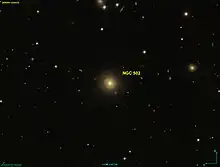| NGC 502 | |
|---|---|
 SDSS view of NGC 502 | |
| Observation data (J2000[1] epoch) | |
| Constellation | Pisces[2] |
| Right ascension | 01h 22m 55.5s[3] |
| Declination | +09° 02′ 57″[3] |
| Redshift | 0.008279 ± 0.000163[1] |
| Heliocentric radial velocity | (2472 ± 49) km/s[1] |
| Distance | 113 Mly[4] |
| Apparent magnitude (V) | 12.7[2] |
| Apparent magnitude (B) | 13.7[2] |
| Characteristics | |
| Type | S0[2] |
| Apparent size (V) | 1.1' × 1.0'[2] |
| Other designations | |
| GC 293, 2MASS J01225553+0902570, UGC 922, PGC 5034 [1][5] | |
NGC 502, also occasionally referred to as PGC 5034 or UGC 922, is a lenticular galaxy in the constellation Pisces.[2] It is located approximately 113 million light-years from the Solar System[4] and was discovered on 25 September 1862 by German astronomer Heinrich Louis d'Arrest.[5] When the Morphological Catalogue of Galaxies was published between 1962 and 1974, the identifications of NGC 502 and NGC 505 were reversed. In reality, NGC 502 is equal to MGC +01-04-041 and not MCG +01-04-043 as noted in the catalogue.[6]
Observation history
Arrest discovered NGC 502 using an 11" reflecting telescope in Copenhagen. His position, which he measured on four separate nights, matches with both UGC 922 and PGC 5034.[6] John Louis Emil Dreyer, creator of the New General Catalogue, described the galaxy as "considerably bright, small, round, brighter middle and nucleus".[5]

See also
References
- 1 2 3 4 "NGC 502". Retrieved 2017-12-09.
- 1 2 3 4 5 6 "Revised NGC Data for NGC 502". spider.seds.org. Retrieved 2017-10-05.
- 1 2 "Your NED Search Results". ned.ipac.caltech.edu. Retrieved 2017-10-05.
- 1 2 An object's distance from Earth can be determined using Hubble's law: v=Ho is Hubble's constant (70±5 (km/s)/Mpc). The relative uncertainty Δd/d divided by the distance is equal to the sum of the relative uncertainties of the velocity and v=Ho
- 1 2 3 "New General Catalog Objects: NGC 500 - 549". cseligman.com. Retrieved 2017-10-16.
- 1 2 "astronomy-mall.com/Adventures.In.Deep.Space/NGC%201-7840%20complete.htm".
External links
- NGC 502 on WikiSky: DSS2, SDSS, GALEX, IRAS, Hydrogen α, X-Ray, Astrophoto, Sky Map, Articles and images
- SEDS